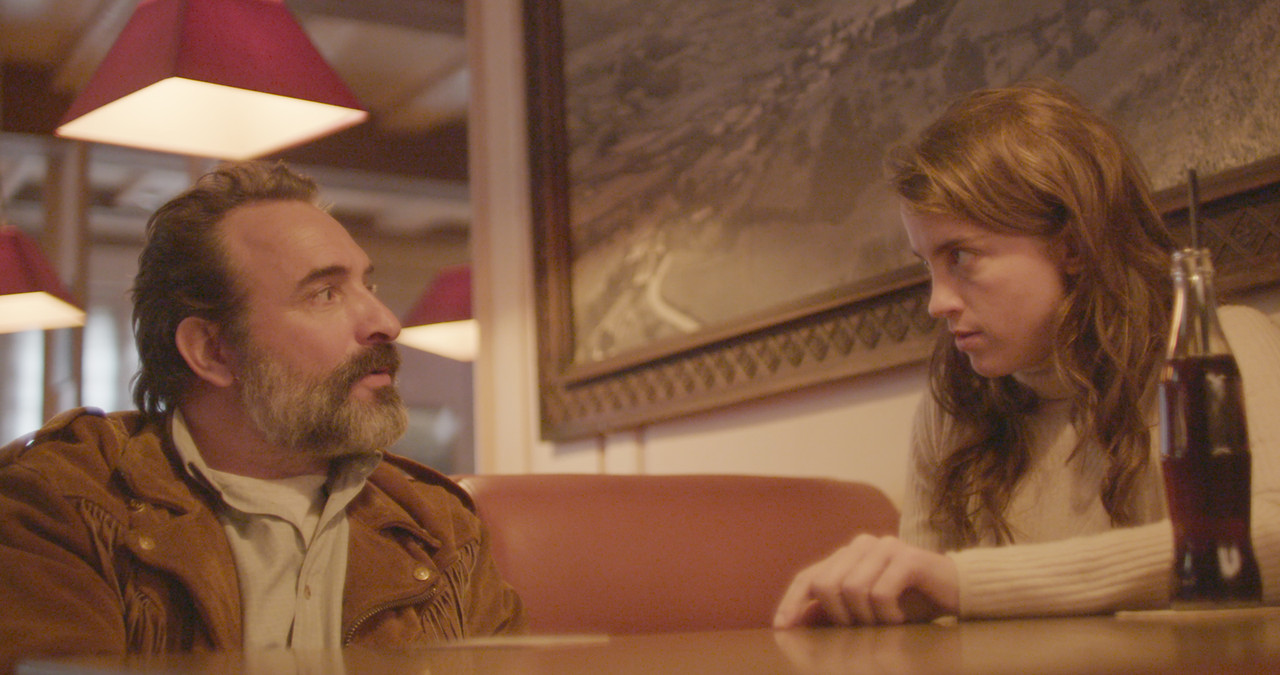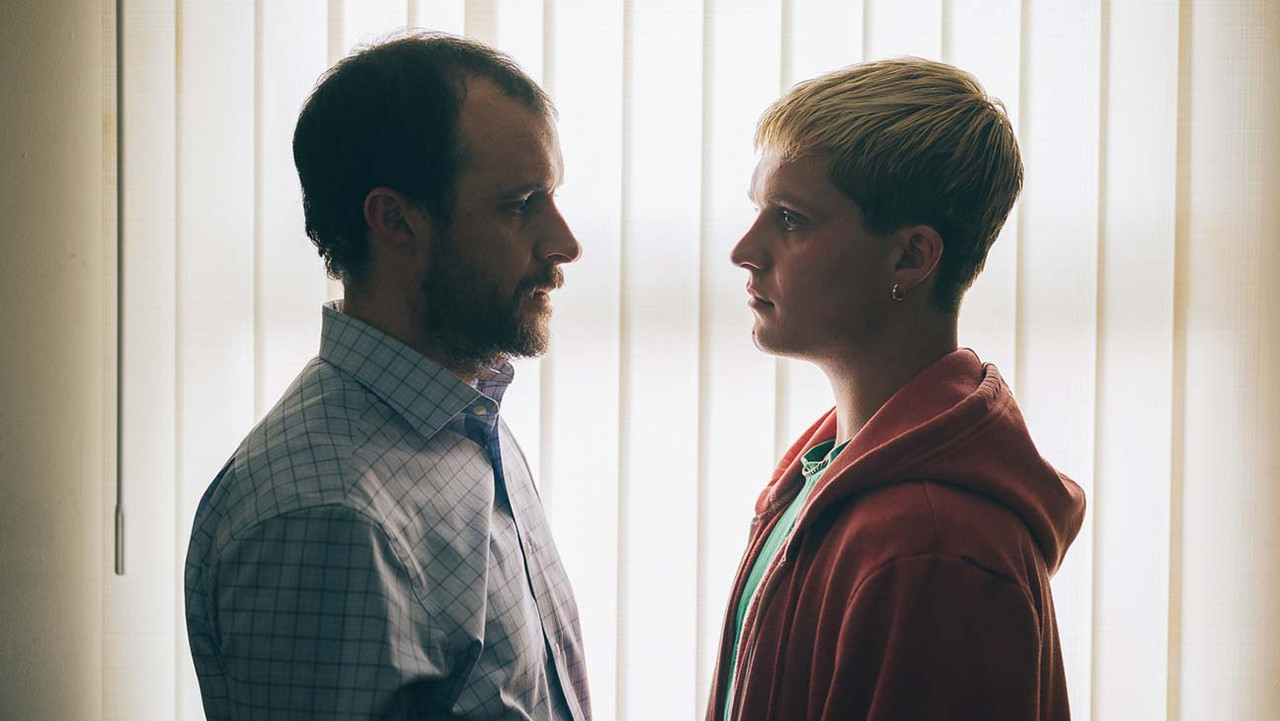Deerskin
Dir: Quentin Dupieux
It has been a while since the UK has heard from Quentin Dupieux, the musician turned determinedly weird horror filmmaker who debuted with Rubber, a film about a killer tyre. This is far from his first film since, but it’s the first to make an international splash for a while.
Deerskin sees Jean Dujardin (still best known to international audiences for The Artist) as Georges, who appears to have left everything behind to buy a 100% deerskin jacket. Soon, he hears the jacket tell him it should be the only jacket in the world. One night he tells Denise, a barmaid (Adele Haenel, also at LFF in Portrait of a Lady on Fire), that he’s a filmmaker and she responds that she, in her spare time, is an editor. Together they begin making a film. You know, that old story.
Deerskin couldn’t be accused of being a deep film. Dupieux largely deals in strangeness for its own sake. If there’s any larger point that he’s making then it’s probably in the fact that Denise finds such interest and potential in Georges’ poorly framed and self-obsessed (or jacket obsessed) footage; perhaps a sideswipe at fans and critics who’ll reach for meaning in anything. Which likely means that, at this point, the joke is very much on me.
The film works because, from both behind and in front of the camera, everyone plays it straight, which has the effect of accentuating the absurdity and making it funnier. This is true from one of the very first images, which finds Georges trying to flush his suit jacket down a service station toilet, right through to the final scene. Dupieux doesn’t do anything flashy with the direction, again trying to ground his silliness in something that, if it doesn’t feel entirely like the real world, we can accept on its own terms. The visuals can feel a little flat—deadpan, perhaps—but this may also be something of a reflection of Georges’ own unpracticed filmmaking (and again, the joke’s on me).
Jean Dujardin is brilliantly matter of fact as Georges. As he slips further from reality he creates a voice for the jacket. At some points Dupieux lets us see Georges speaking for it, but increasingly as the film goes on he allows us to see how tenuous Georges’ grip on what’s real has become by framing his face out when ‘the jacket’ is speaking. To talk about exactly how things go down would be a shame, as it would spoil some of the film’s funniest sequences, but suffice to say that Deerskin develops increasing shades of American Psycho, including its main character’s obsession with how he looks to the outside world) as it goes on. Adele Haenel’s role might look thankless at first glance; a facilitator more than a character. That may have been true at script level, but Haenel is a huge talent. She has what seems like a simple gift, but one which is incredibly rare; the ability to always seem real on screen. In this way, she provides the film a grounding influence of sorts, but the character is also credibly sucked into Georges’ world, culminating in a brilliant final image. I would absolutely watch a film that picked up from that moment.
Deerskin is, ultimately, a bit inconsequential. It is huge fun in the moment, but I’m not sure that much besides that will linger. However, that’s more than many films ever achieve and for 77 minutes it is highly entertaining and engagingly weird company.
★★★½
Rialto
Dir: Peter Mackie Burns
With his 2017 debut, Daphne, Peter Mackie Burns established himself as a British director to watch. Powered by a searingly honest performance from Emily Beecham, that was an engaging drama that felt honest about the experience of being thirtysomething and single in London. Mackie Burns’ follow up in some way stakes out similar territory, focusing on one character and their struggles with relationships, sex and identity.
Colm (Tom Vaughn-Lawlor) is middle aged, working a job he doesn’t seem particularly interested in and equally disconnected at home from his wife (Monica Dolan) and their teenage kids. He begins a series of encounter with a much younger man (Tom Glynn-Carney) as his life outside this relationship begins to cave in around him.
What Rialto has in common with Daphne is the centrality and quality of its leading performance. Tom Vaughn-Lawlor’s performance is heartrending to watch, as Colm tries to find a space in which he can be fully himself and deals with the guilt of that not being at home with his wife and children. He is devastating in a couple of scenes in particular; one coming home after a long night getting drunk, only to faced with explaining himself to his wife and, later, finally spitting out his true feelings, directly in the face of his 18-year-old son. A less familiar face, but also very good, Tom Glynn-Carney brings more complexity than you might imagine to what might be a cliche role as a male prostitute. He’s especially humanised in a late scene ar his home, which is a touching contrast to the more menacing way he’s seen early in the film. I just wish I’d found the film around these performances quite as effective.
Written by Mark O’Halloran, the screenplay struggles to shed its stage origins. The dialogue, more so than in Daphne, feels constructed rather than something we’re just hearing the characters say for the first time. Aside from the two leads, the characters are lightly sketched, with Colm’s kids notably underwritten. The images are also a mixed bag. Though Adam Scarth’s (Daphne, Apostasy) cinematography often captures a certain stark beauty (the late scene of Colm walking to the sea late at night) the direction feels a bit flat. The dialogue and performances are the main storytelling engines here. There aren’t many shots that are memorable in and of themselves, and nothing that has stuck with me the way an early shot in Daphne, of Beecham descending an escalator, has.
On the whole, Rialto is worth seeing for its two central performances, but the film surrounding them never quite lives up to them and this has to, for me, go down as something of a disappointment from Peter Mackie Burns, given the expectations set by his last film.
★★★



No comments:
Post a Comment